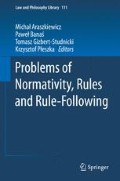Abstract
Proponents of so called “semantic phenomenology” claim that we are able to hear meanings when we hear meaningful utterances. Recently, Philip Goff has proposed his interpretation of semantic phenomenology that leads to the conclusion that the sceptical problem posed by Saul Kripke in his Wittgenstein on rules and private language must be solvable. My aim in this chapter is to question this view by showing that the way Goff conceives the epistemology of meanings is not compatible with the basic intuition about the possibility of linguistic error. Consequently, we cannot rightly say that our phenomenal experiences represent meanings. The conclusion is that the existence of the conscious phenomena described by semantic phenomenology is irrelevant to the ontological problem of existence of rules and meanings. At the end, I sketch an alternative picture of the role played by conscious experience in our use of language.
Access this chapter
Tax calculation will be finalised at checkout
Purchases are for personal use only
References
Burge, Tyler. 1979. Individualism and the mental. Midwest Studies in Philosophy 4:73–121.
Davidson, Donald. 1984. First person authority. Dialectica 38:101–113.
Davidson, Donald. 2005. Nice dearangment of epitaphs. In Donald Davidson Truth, language and history, 89–108. Oxford: Clarendon.
Glüer, Kathrin, and Peter Pagin. 1999. Rules of meaning and practical reasoning. Synthese 117:207–227.
Goff, Philip. 2012. Does Mary know I experience plus rather than quus? A new hard problem. Philosophical Studies 160:223–235.
Hattiangadi, Anandi. 2006. Is meaning normative? Mind and Language 21:220–240.
Hattiangadi, Anandi. 2007. Oughts and thoughts. Oxford: Clarendon.
Jackson, Frank. 1973. Is there a good argument against the incorrigibility thesis? Australasian Journal of Philosophy 51 (1):51–62.
Kripke, Saul. 1982. Wittgenstein on rules and private language. Cambirdge: Harvard University Press.
McDowell, John. 1984. Wittgenstein on following a rule. Synthese 58:326–363.
Millar, Alan. 2002. The normativity of meaning. In Logic, thought and language, ed. Anthony O’Hear, 57–74. Cambridge: Cambridge University Press.
Miller, Alex and Saboohi, Ali. forthcoming. Rule-Following and Consciousness: Old Problem or New? Acta Analytica 1–8.
O’Callaghan, Casey. 2011. Against hearing meanings. The Philosophical Quarterly 61:783–807.
Putnam, Hilary. 1975. The meaning of ‘meaning’. Minnesota Studies in the Philosophy of Science 7:131–193.
Siegel, Susanna. 2006. Which properties are represented in perception? In Perceptual experience, ed. Tamar Szabo Gendler and John Hawthorne, 481–503. Oxford: Oxford University Press.
Whiting, Daniel. 2007. Meaning, norms, and use: Critical notice of Donald Davidson’s truth language and history. Philosophical Investigations 30 (2):179–187.
Wikforss, Asa. 2001. Semantic normativity. Philosophical Studies 102:203–226.
Wright, Cripsin. 2001. Wittgenstein’s Wittgenstein’s rule-following considerations and the central project of theoretical linguistics. In Crispin Wright Rails to infinity, 170–214. Cambridge: Harvard University Press.
Acknowledgments
The author thanks Alex Miller and Jedrzej Grodniewicz for their helpful comments.
Author information
Authors and Affiliations
Corresponding author
Editor information
Editors and Affiliations
Rights and permissions
Copyright information
© 2015 Springer International Publishing Switzerland
About this chapter
Cite this chapter
Posłajko, K. (2015). Knowing Way Too Much: A Case Against Semantic Phenomenology. In: Araszkiewicz, M., Banaś, P., Gizbert-Studnicki, T., Płeszka, K. (eds) Problems of Normativity, Rules and Rule-Following. Law and Philosophy Library, vol 111. Springer, Cham. https://doi.org/10.1007/978-3-319-09375-8_4
Download citation
DOI: https://doi.org/10.1007/978-3-319-09375-8_4
Published:
Publisher Name: Springer, Cham
Print ISBN: 978-3-319-09374-1
Online ISBN: 978-3-319-09375-8
eBook Packages: Humanities, Social Sciences and LawLaw and Criminology (R0)

